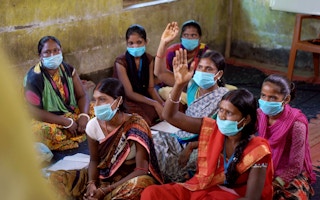When videos of two women being paraded naked and assaulted in India’s Manipur went viral last week on social media, the remote northeastern state had been cut off from internet access for nearly three months.
The attack took place on May 4, but the videos of the women being dragged and groped by armed men before what onlookers say was a gang rape, surfaced last week. Authorities said they are investigating the incident and have arrested several men.
Officials imposed a statewide internet shutdown on May 3, saying it was needed to curb rumours and disinformation, and quell violent ethnic clashes that have killed at least 125 people and displaced tens of thousands.
But the internet ban in the state - among the longest in India to date - has made it difficult to alert authorities and journalists to rights violations, many of them directed at women, activists say.
“If there was no internet shutdown, those videos would have surfaced over two months ago and the horror could have been addressed speedily, and other similar offences could have been curbed,” said Patricia Mukhim, an activist and editor of the Shillong Times daily in the northeastern state of Meghalaya.
“The internet shutdown is a violation of human rights - it curtails people’s freedom, and it shuts out news of violent incidents and allows perpetrators to carry on undeterred,” she told Context.
The shutdowns also have an “adverse impact on women’s ability to feel safe and restrict their freedom of movement,” said Jayshree Bajoria, an associate director at Human Rights Watch in Asia.
“It took a horrific video of violence against women in Manipur to emerge on social media for the authorities to take action. This shows how necessary the internet is for the flow of information, and reporting and documenting abuses,” she said.
After the Manipur high court directed the state government to restore the internet in a “limited fashion”, authorities on Tuesday said they had “conditionally” lifted the ban on broadband services.
“
The internet shutdown is a violation of human rights - it curtails people’s freedom, and it shuts out news of violent incidents and allows perpetrators to carry on undeterred.
Patricia Mukhim, editor, Shillong Times
Social media websites, WiFi hotspots, virtual private networks (VPNs) and mobile internet - used by a majority of people - still remain blocked in Manipur.
Adverse impact
India had the most number of shutdowns in the world for the fifth successive year in 2022, according to Access Now, a digital rights group.
The shutdowns - including during protests, elections and examinations - were often imposed for indefinite periods and without the publication of shutdown orders, in violation of a 2020 judgment by the nation’s top court.










